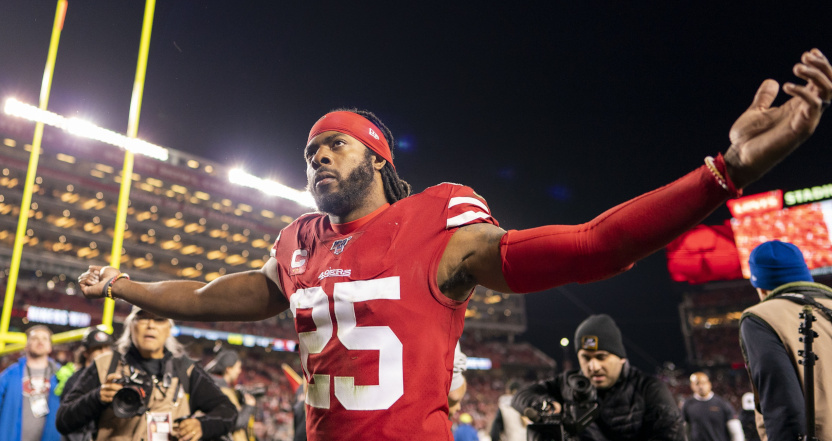Back in March 2018, defensive back Richard Sherman signed a three-year contract with the San Francisco 49ers following his release by the Seattle Seahawks, and did so while acting as his own agent. That contract took a lot of criticism from NFL reporters and analysts, as it was very different from what we’ve often seen in NFL contracts; it was heavily incentive-loaded and had no guaranteed money beyond the first year. That led to pieces like “Richard Sherman’s five missteps in negotiating his contract with the 49ers” (from Ben Volin of The Boston Globe), with Volin arguing “Boy, did the 49ers take Sherman for a ride” and “realistically, [Sherman] will get one year and $7 million out of this contract.”
Well, that contract has worked out much better for Sherman than many of the critics expected. He’s continued to play at a high level and has hit many of his incentives, including a Pro Bowl selection ($1 million) and now a second-team AP All-Pro selection for this season (announced Friday) that gives him another $2 million. And following that All-Pro selection, Sherman proceeded to dunk on those who criticized him for acting as his own agent:
Fans please find me all those “He negotiates a bad deal” receipts…. I wanna see something
— Richard Sherman (@RSherman_25) January 3, 2020
Remember this? Pockets looking right. https://t.co/B7nwsQjGwq
— Richard Sherman (@RSherman_25) January 3, 2020
Hahahaha https://t.co/hfB4jHi6Lx
— Richard Sherman (@RSherman_25) January 3, 2020
Been a hell of a ride so far. I’m enjoying it https://t.co/QHpyawMnAC
— Richard Sherman (@RSherman_25) January 3, 2020
Yea appreciate this brilliant take. https://t.co/LU3sP0jT38
— Richard Sherman (@RSherman_25) January 3, 2020
Maybe it’s a tale of players knowing their abilities and believing in themselves. More players have incentives that can’t be achieved and are negotiated by agents but hey let’s not talk about that https://t.co/Jet2cJoQyC
— Richard Sherman (@RSherman_25) January 3, 2020
Hahahaha that’s almost exactly what happened https://t.co/4BRKhzZ8et
— Richard Sherman (@RSherman_25) January 3, 2020
Hahahahahahaha https://t.co/FaRxGIURMQ
— Richard Sherman (@RSherman_25) January 3, 2020
Hahahahaha made a few more https://t.co/m4o9HuHPZj
— Richard Sherman (@RSherman_25) January 3, 2020
No agent fees for me. Get to keep the money that I earned. Fellas these agents negotiate incentives into deals all the time. You do all the work achieving them and they see the benefit. 🤷🏾♂️
— Richard Sherman (@RSherman_25) January 3, 2020
Sherman certainly gets the last laugh here, and he has more of a point here than he has had with some of his past shots at media. It’s worth noting, though, that there was some logic behind some of the criticisms of that contract at the time. Sherman turned 30 in March 2018, had just been cut by the Seahawks, and was coming off a ruptured Achilles tendon that ended his 2017 season. Many players 30 or older don’t stay in the NFL much longer, especially after serious injuries and especially after being released by one team already, and that’s why there’s often a focus from agents on having contracts feature guaranteed money or easy-to-hit incentives rather than difficult ones like Pro Bowl or All-Pro selections.
If Sherman had suffered further injury setbacks or hadn’t returned to playing at a high level, then the critics’ arguments would have made some sense; his contract didn’t have a lot guaranteed, and it could have led to him not getting much out of it. But the key mistake from critics like Volin was to assume that Sherman was incapable of negotiating higher guarantees himself, and to assume that he signed onto a production-focused risk-or-reward deal at the team’s behest. Instead, his contract was a bet on himself, accepting lower guarantees in return for higher potential payouts and doing so with a team where he fit in well. And he clearly figured out incentives that he could actually hit (despite widespread skepticism that he would). And with him having those goals in mind and having that risk-and-reward focus in mind, it made sense for him to negotiate this deal himself rather than pay an agent’s fee.
Of course, that doesn’t mean that all other players should immediately follow Sherman’s approach here. Risk-or-reward contracts often don’t pay off, and getting what you can in guaranteed money can be a better approach for some. And acting as your own agent doesn’t always work out either; there can be value in agents knowing the market and knowing specific contract structure details. But what the Sherman case really shows is the tendency of many media to assume that the conventional wisdom is in fact wisdom, and that anyone challenging it is obviously stupid. If Volin had merely pointed out “Sherman is making a risky bet on himself,” that would have been fine; he was. But elevating that to insults to Sherman’s intelligence like “taken for a ride” was foolish, as Sherman’s subsequent success with this deal illustrates.







